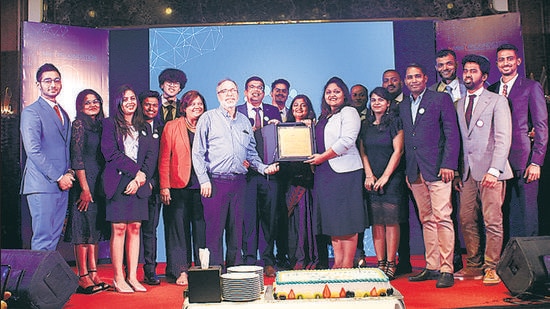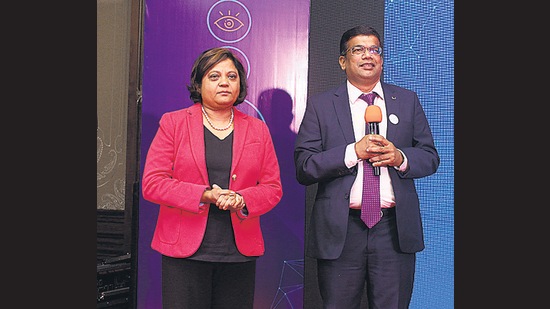Startup mantra: Preventive care for the brain, AI-driven
The cloud- based clinical decision support tool helps neuro-radiologists, neuro-physicians, psychiatrists and general physicians better understand the brain effects of different conditions by utilising 3D MRI images to their fullest, extracting data and providing volumetric analysis for the brain and its various structures
Rajesh Kumar Purushottam and Dr Latha Poonamallee, the founders of InMed Prognostics, developed NeuroShield, an artificial intelligence (AI) software which can diagnose as well as predict the onset of neurological disorders. The cloud- based clinical decision support tool helps neuro-radiologists, neuro-physicians, psychiatrists and general physicians better understand the brain effects of different conditions by utilising 3D MRI images to their fullest, extracting data and providing volumetric analysis for the brain and its various structures.

Rajesh Kumar Purushottam hails from Goa and has done his BE in Industrial Engineering and an MBA. He started his career as a shop-floor engineer after he joined Thermax in Pune as a trainee in 1993.
Thereafter he has worked in several multinational companies like KPIT Infosystems, Motorola, GE Capital International Services, Motorola India, John Deere India and Vedanta group.
Latha Poonamallee did her BA and MA from University of Madras and MBA from Pondicherry University. She did her PhD from Case Wetern Reserve University in Ohio. She joined the university as a senior lecturer and is presently working at the New School in New York as an associate professor.
Dinner table conversation has a startup idea as its entree
Purushottam founded a health informatics company Statim Healthcare in 2013, which provided teleradiology services to hospitals. Although Purushottam is in the process of exiting the startup, that exposure led him to the particular area of artificial intelligence in radiology.
Says Purushottam: “I met Latha and her husband, Dr Al Curran, in 2017 in the US. A dinner table conversation was converted into an idea for a startup.”
Recalling the early days, Poonamallee says, “We have been friends for over 20 years. A few years back, Rajesh helped me arrange some meetings in Bengaluru for my university students. While we were chatting then, I told Rajesh that the services business is value capturing. Why don’t do you do something in value creation like a product business? After that, when Rajesh was visiting me in the US with his family, he came up with this idea and proposed to start InMed Prognostics.”
Why neurological disorders?
Says Poonamallee, “When you are looking at the product market and product creation in radiology, the brain is the final frontier. One of our goals is to bring the brain into the preventative space. We undergo tests for heart ailments, blood pressure or diabetes, but there is nothing to do for brain. Also, there are no existing comparable tools to that we have outside of the white people’s population. We wanted to bring state-of-the-art tools that are affordable, accessible and reliable, and evidence-based to other populations also. We call it design justice. There is stigma associated with and also a lack of awareness about these disorders being preventative. We have done research and presented in Europe about our tools and predictive models predicting early dementia even in the 30s.”
Early adopters
Says Purushottam, “A few years back there was misunderstanding that AI can replace radiologists, but we don’t frame it like that at all. We only support clinical decision making. We don’t provide diagnosis. We only provide additional and accurate information that saves times for the physician, radiologist, neurologists and neurosurgeon, to be more effective.”
“Our earliest adopters and supporters were neurologist Dr Rahul Kulkarni from the Deenanath Mangeshkar Hospital and paediatric neurologist Dr Deepa Divekar from Sahyadri Hospital. They helped me understand the local market and what they are really struggling with. We are also working with Dr Deepak Agarwal and the All-India Institute Medical sciences (AIIMS). He is on our scientific advisory board. Dr Ram Mohan Vadapalli from Vijaya Diagnostics in Hyderabad, one of renowned radiologists in the country, is also associated with us. Hospitals are buying our product. Our adoption rate is increasing partly because we have worked a lot with these physicians,” Purushottam claims.

Data security
Explaining the data security measures, Poonamallee said, “Our tool extracts the data, images from the client-side server to our cloud but completely strips all identifiable information. With 3D MRI it is easy to reconstruct the persons face and hence, we remove the identifiable information in a way that the face cannot be reconstructed. Along with the report we also provide a lot of data visualisation to the physician if they want to look at segmented portions.”
MVP and approvals
InMed Prognostics has got Central Drugs Standard Control Organisation (CDSCO) approval which is very important for using software as a medical device. Says Poonamallee, “We have the minimum viable product (MVP) ready registered on the Government E-marketplace (GeM). We are in discussion with a government hospital in Goa which will be our first government sector client.”
Accuracy and challenges in adoption
Says Purushottam, “AI in healthcare is not very common and that is the biggest challenge we have in adoption. We have done about 1,200 healthy controls and we got a DST funding for that from Birac, basically to create what we call as an Indian brain template. We are at a 90 per cent accuracy level. We use the convolutional neural network which is a very advanced way of deep learning so that as your healthy control data improves the predictive accuracy keeps increasing.”
“With the help of AI, we can co-relate a lot of researches already based on it. To aid that kind of a decision support framework, the decision tree actually mimics the decision making of a clinician. For that we have to capture the inter-operator variability. Evidence creates transparency and accountability, so we also map the clinical setting and then look at the contextual evidence so that it can lead to a certain outcome. We have a customer success team which is always monitoring the product performance,” Purushottam explains.
Tie-ups and adoption strategy
InMed Prognostics has a pan-India presence with tie-ups with almost all major hospitals in the states like Delhi, Goa, Kerala, Bihar, Uttar Pradesh. Elaborating on their strategy, Purushottam says, “We go to the oldest diagnostic centre in the state capital which becomes a reference point and they refer us to the neurophysician or neurologist – the point of prescription and further a point of sale. We developed and trademarked Neuroshield as a brand which made it easy for doctors to recall it. It is in written in the prescription so that specific sequence or setting is taken at the time when the patient shows the requisition at the diagnostics centre and the charges are also collected. This way we also justify an additional payout for the customer in the range of ₹2,500 to Rs3000 at the diagnostic centre.”
Funding
Says Poonamallee, “Birac gave us a ₹50 lakh grant and offered a ₹1 crore investment that didn’t come to pass for multiple reasons. From friends and family, we have raised ₹3.5 crores so far. Currently we are in process of doing another ₹3.5 crore seed round with institutional investors.”
Role of GE healthcare accelerator and venture centre incubator
InMed Prognostics was incubated at the Venture Centre at the NCL Innovation Park in Pune. “Venture Centre has been extremely instrumental in providing us a great ecosystem. They helped us get the Birac grant in terms of providing us legitimacy, good feedback on the market locally and understanding the system. Dr V Premnath has been very instrumental in helping us to strategically think through the technical challenges, how we make sure we get right sample, standardisation of data etc. GE Edison Healthcare platform is extraordinary gift and source of strength and technical expertise for us. We had amazing technical and business mentoring and integration with GE platforms and console. Our product is fairly OEM agnostic. They are going to be our sales channel partner in South Asia,” the founders explain.



